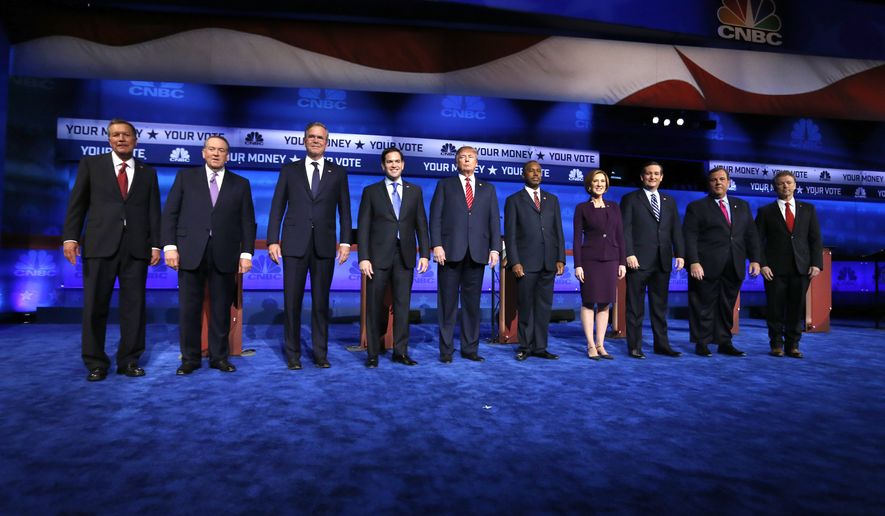The GOP candidates had squared off in eight debates at this point in the last presidential cycle, and pizza parlor magnate Herman Cain was leading the polls in Iowa as voters tested every single Republican alternative to Mitt Romney.
This year, the Republican National Committee has tried to keep a tighter rein on things, with the candidates meeting Wednesday for just their third debate and the dynamics of the race totally different — though once again a black Republican maverick is on top in Iowa and has even taken the lead in some national polls.
Predictions of a boring, overcontrolled campaign have not come to pass. Indeed, interest is higher than ever, with the first two debates setting records for viewership, and with voters following the ups and downs of the crowded field online.
“The net result is that more eyeballs are watching our debates than ever before in history — by a ton,” said Ron Kaufman, an RNC member from Massachusetts who served in George H.W. Bush’s administration. “We really have a diverse and good, solid lineup of candidates, and that has aided the whole thing.”
Shaun Steel, an RNC member from California, said the changes have worked out “even better than our best hope.”
“The ratings are off the roof,” Mr. Steel said. “It has given guys and gals a chance to shine that they never would have had before.”
Whether the outcome will be different remains to be seen.
As of this week, retired neurosurgeon Ben Carson has seized the lead in the latest polls in Iowa, and some national surveys, edging out businessman Donald Trump, who’s led since the early summer.
By contrast, the field in 2011 had already cycled through a number of top candidates as restless voters chewed up and spit out the offerings.
The issues, meanwhile, remain eerily similar. Immigration policy is still hotly debated, while taxes and the war against terror remain top issues.
In 2011, the first question at the first debate, held in early May, was about whether Mr. Obama could still be called “weak” on foreign policy after approving the raid that killed Osama bin Laden.
This campaign, the names have changed — the Islamic State, not al Qaeda, is the bigger threat — but Mr. Obama’s stance on fighting terror in the Middle East is still taking fierce hits.
Still, in a sign of the disjointed GOP field, the leadoff question in August’s inaugural debate was whether the candidates would agree to support the eventual nominee — which seemed designed to be an effort to paint Mr. Trump, who eventually agreed to support the party’s nominee, into a corner.
Mr. Romney emerged from the 2012 campaign with the GOP’s nomination, but was bloodied by the more than two dozen debates, where he repeatedly had to drift further to the right, including on immigration, costing him the centrist voter appeal that was supposed to be the key to a general election victory.
“The race was basically one insider versus a bunch of outsiders, and the outsiders split the most conservative/evangelical vote while Romney consolidated the middle of the party, allowing him to win the nomination,” said Kyle Kondik, of the University of Virginia’s Center for Politics. “This time, there is not nearly as much clarity.”
Some analysts say the limited number of debates this cycle has allowed some of the more outspoken candidates — including Mr. Trump and Mr. Carson — to fill the vacuum and seize more of the political limelight, to the detriment of more traditional candidates such as former Florida Gov. Jeb Bush and New Jersey Gov. Chris Christie.
Mr. Steel, though, credited Mr. Trump with strengthening the process.
“Donald Trump has forced everyone very early to sharpen their game. That is a huge blessing,” he said.
GOP political observers said they still expect Mr. Bush, Mr. Christie, Ohio Gov. John Kasich, Sen. Marco Rubio and other establishment-backed candidates to recover themselves — but said the contests so far haven’t focused on the kinds of questions that would lend to those candidates gaining traction.
“We kind of haven’t had a lot of discussion about policy,” said Ellen L. Carmichael, a GOP strategist who worked on Mr. Cain’s 2012 campaign. “It is just a totally different race. The debates are now about personalities.
“Ultimately, I think things are going to shake out as they always have, but I think it is going to be delayed,” said Ms. Carmichael, president of The Lafayette Company.
Mr. Kaufman, who is supporting Mr. Bush, agreed, saying the debate season comes in phases, and that clear policy differences are sure to emerge.
“Then we get into the process of seeing candidates through the prism of whether I really see this man or this woman as president of the United States. That is why a lot of folks who look good in the beginning don’t look good in the end,” he said.
• Seth McLaughlin can be reached at smclaughlin@washingtontimes.com.




Please read our comment policy before commenting.